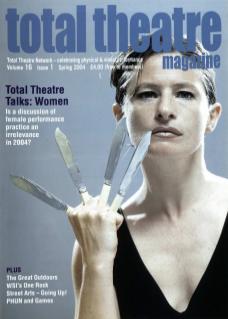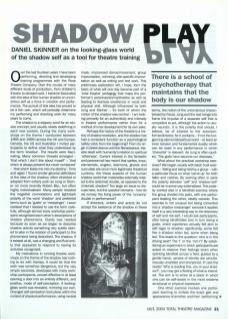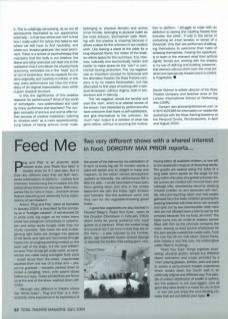Over the last fourteen years I have been performing, directing and developing training programmes with the Rose Theatre Company. Over the course of many different kinds of production, from children's theatre to devised work, I became fascinated with the idea of the human shadow or unconscious self as a force in creation and performance. The pursuit of this idea has proved to be a rich vein, which will probably determine my performing and directing work for many years to come.
The shadow is a slippery word for an elusive concept, and usually needs redefining in each new context. During the many workshops on the theme I conducted between 1995 and 1999 (across the UK and Europe, Canada, the US and Australia) I invited participants to define what they understood by the term 'shadow'. The results were fascinating. Many common threads emerged – ‘that which I don't like about myself’ – 'that which is always present but never contained' – 'that which leads me into my destiny'. Time and again I found similar general definitions of the idea of the shadow, often inherited or adapted from writers such as Jung or Steiner (or more recently Robert Bly), but often highly individualised. Many people resisted the negative connotations and light/dark polarity of the word 'shadow' and preferred terms such as 'guide' or 'messenger'. I soon realised that I needed to use the term carefully, although almost every workshop participant recognised each other's descriptions of shadow phenomena. Clarity was needed because as soon as we began to describe shadow activity something very subtle started to alter in the relation of participant to the phenomena being described. The shadow, if it existed at all, was a changing and fluid entity that appeared to respond to having its activities recognised.
My motivations in running theatre workshops on the theme of the shadow had nothing to do with therapy. It could be that the work was somehow dangerous, but the very simple exercises, developed with many workshop participants, proved effective in at least opening a door into an entirely different, and positive, mode of self-perception. A looking glass world was revealed, mirroring our own. Changed self-perception took place within the context of physical performance, using neutral mask, improvised dance/movement, group improvisation, mirroring, site-specific improvisation as well as writing and text work. This preliminary exploration will, I hope, form the basis of what will one day become part of a ‘total theatre' pedagogy that maps the performer's personas/anima/shadow as well as leading to fearless excellence in vocal and physical skill. Although influenced by both Jung and Steiner – for both of whom the notion of the shadow was central – I am looking primarily for an authenticity and intensity in theatre performance rather than for a method of inner development for its own sake.
Perhaps the history of the theatre is a history of shadow revelation, and the shadow has had a consistent function as a psychological safety-valve from the beginning? From its origin in Greek drama until the Renaissance, theatre dealt with humanity's relation to ‘spiritual otherness'. Current interest in the fantastic and paranormal has meant that sprites, imps, elementals, angeloi, daemons, ghosts and succubae are once more legitimate theatrical currency. Are these aspects of the human shadow world that materialise externally related to the (external) double, as opposed to the (internal) shadow? Too large an issue to discuss here, but the question remains – how do we convey the living power of the 'uncanny’ double in performance?
If directors, writers and actors do not accept the existence of the shadow in these terms, the notion of the unconscious characterised by Freud, Jung and the rest brings into frame the impulse of a separate self that is compelled to act, although the action is usually neurotic. It is this polarity that should, I believe, be of interest to the actor/performer/director, for it contains – if not the burgeoning elemental/spiritual world – at least an inner tension and fundamental duality which can be used in any performance in which 'character' is relevant. As Jung is often quoted, ‘The gods have become our diseases.'
What about the practical workshop exercises? We began usually with basic trust exercises – falling and being held by a group – with a particular focus on what ‘came up' for both faller and catcher. By working often in pairs the polarity between 'self' and 'shadow-self’ could be in some way externalised. This polarity worked also in a blindfold exercise where the group divided into pairs, with one participant leading the other, ideally outside. This exercise is not unusual but being converted into a 'shadow messenger' exercise it applies itself in a very interesting way to the discovery of self and not-self. I would ask participants, after being blindfolded and in turn being a guide, which experience actually felt akin to self (ego) or shadow: significantly, some felt like a shadow when led, some when being led. This leads to the question: Who is in the driving seat? The ‘I’ or the 'not-I'? By establishing an experiment in which participants are asked to observe their feelings (even when sprinting blindfold across a field, guided by a gentle hand), senses of identity are simultaneously unsettled and sharpened. If I ask the reader 'Who is reading this, you or your shadow?', you may get a feeling of what is intended. The aim is to arrive at a place in which one can be self-aware in the most extreme emotional or physical expression.
One other exercise involves one participant learning to imitate the exact gait and appearance of another, and then 'performing’ it. This is unfailingly stimulating, as we are all adolescents fascinated by our appearance externally – is that how others see me? Is that how I really walk? For actors this helps to see where we still have to find neutrality, and where our ‘shadow gestures' are most prominent. There is a school of psychotherapy that maintains that the body is our shadow: the above and other exercises can lead one to the realisation that if one allows the physical body autonomy, controlled not in the 'head' but in an act of awareness, then its capacity for creative originality and creativity is infinite. In this way, every performance can have the immediacy of an original improvisation even within a given physical structure.
Is this the significance of this shadow research for performance? What of the world of 'archetypes', now systematised and used by many performers and teachers? The Jungian concepts of animus and anima offer further sources of creative inspiration: referring to 'shadow-work' as a mere apprenticeship, Jung talked of facing animus (inner male, belonging to physical female) and anima (inner female, belonging to physical male) as the more arduous, ‘journeyman' path. Working with the shadow is inspiring because it allows a place for the unknown in our creative work. Like leaving a place at the table for a long-departed friend, the notion of the shadow allows space for the numinous. It is, however, culturally and economically harder and harder to make space for the 'not-I' in commercial touring production. The ‘via negativa’ was an important concept for Grotowski and the laboratory theatre; the Rose Theatre company is by no means Grotowskian, but has attempted to find ways of working with a spiritual dimension, without dogma, both in productions and in training.
The 'via negativa' avoids the familiar and even the 'new’, which is an altered version of the known. I am interested by performers who have overcome their fears or self-satisfaction, and give themselves to the unknown. So much 'new' output is a variation of what has gone before, without re-sourcing the motivation to perform. I struggle to cope with an addiction to seeing and creating theatre that includes ‘the other', if only in the sense of containing an inner tension or sense of a threshold. Only then are performers challenging themselves to overcome their habit of eclipsing themselves, missing the opportunity to learn in the moment what their actions signify. Simply put, working with the shadow is my way of defining and building ‘presence' – that element without which even the most polished and spectacular theatre event is instantly forgettable.
Daniel Skinner is artistic director of the Rose Theatre Company and teaches voice at the London International School of Performing Arts (LISPA).
Contact dan skinner@btinternet.com for information on residential workshops with the Rose Training Academy at the Penquoit Centre, Pembrokeshire, in April and August 2004.


